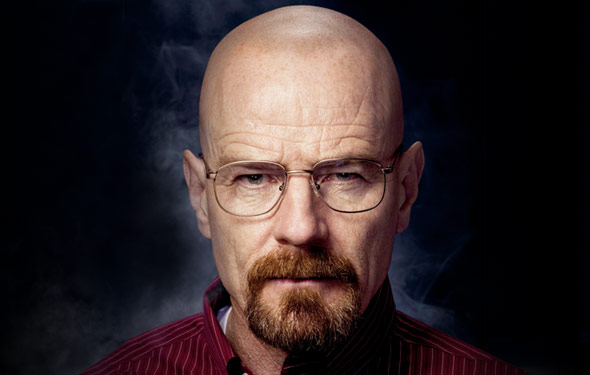“Breaking Bad” is usually discussed in terms of its moral vision, and its unflinching depiction of Walter White’s decent into evil. Chuck Klosterman’s is probably the best-known encapsulation of the argument.
Breaking Bad is not a situation in which the characters’ morality is static or contradictory or colored by the time frame; instead, it suggests that morality is continually a personal choice. When the show began, that didn’t seem to be the case: It seemed like this was going to be the story of a man (Walter White, portrayed by Bryan Cranston) forced to become a criminal because he was dying of cancer. That’s the elevator pitch. But that’s completely unrelated to what the show has become. The central question on Breaking Bad is this: What makes a man “bad” — his actions, his motives, or his conscious decision to be a bad person? Judging from the trajectory of its first three seasons, Breaking Bad creator Vince Gilligan believes the answer is option No. 3. So what we see in Breaking Bad is a person who started as one type of human and decides to become something different. And because this is television — because we were introduced to this man in a way that made him impossible to dislike, and because we experience TV through whichever character we understand the most — the audience is placed in the curious position of continuing to root for an individual who’s no longer good.
Admittedly, I’m only through season 1 at the moment. But still, I see the trajectory Klosterman is talking about; Walt kills and sells meth and blows people up, and we still root for him.
Klosterman suggests that we root for evil because the show starts us off by sympathizing with Walt. I think that rather misses the point of the genre conventions though. You don’t root for a bad ass despite the fact that he’s a bad ass. You root for him because he’s a bad ass. Rorschach is cool not despite the fact that he shoots a policeman in the chest with a grappling gun, but because he does so. Similarly, when Walt shaves his head, goes into the drug dealers den, and uses his chemical no-how to create a huge explosion and intimidate the heavies — we don’t root for him despite that. We root for him because of it.
The first season of Breaking Bad isn’t coy about this dynamic. On the contrary, it presents good Walt, his good family, and his good milieu as hopelessly square, hypocritical, and ridiculous. Walt’s wife, Skyler, comes across as a moralistic busybody, snooping around after Walt and freaking out over his (supposed) pot use. Hank, Walt’s brother-in-law the DEA agent, is equally ridiculous, trying to scare Walt’s son straight in a painfully embarrassing scene in which he burbles anti-drug war bullshit while callously bullying the random druggies passing by. Walt himself is an ineffectual high-school teacher and a wimpish nonentity, sclubbing along in Hank’s shadow, boring his students, and generally epitomizing castrated middle-class suburban white lameness.
Until, that is, he embraces the dark side. After learning he has cancer and deciding to cook meth to support his family after he’s gone, Walt suddenly starts to become tough, sexy, powerful — a character who demands admiration rather than contempt. He defends his crippled son from bullies; he destroys the car of an insufferable cell-phone yakking stock trader; he faces down drug-dealers; he even starts subtly bullying Hank rather than the other way around. He changes from a colorless nothing to a dark hero — and who, given those options, wouldn’t root for the dark hero, not only because he’s a hero, but because he’s dark?
“Breaking Bad” does show the downsides of White’s choices as well. By stealing from the school science supplies for his meth cooking, he ends up drawing the police down on the saintly Hispanic janitor. The scriptwriters also take care to make a drug-dealer intelligent and thoughtful so we’ll sympathize with him when Walter has to kill him. Yet, the very effort to drive these moral lessons home can’t help but to contradictorily glamorize them. Walt is making Big Decisions with Big Consequences; he moves in a world of Drama and Tragedy. Who wouldn’t rather be Hamlet than Guildenstern?
As a contrast, consider Flannery O’Connor’s collection Everything That Rises Must Converge. All of these stories are about regular people — people like Walter — choosing between good and evil. But in O’Connor’s world, there’s nothing particularly exciting or sexy about going bad. Instead, sin is a small, stupid, sordid business, made up mostly of ingratitude, egotism, stupidity, and willful blindness. It’s not becoming the best damn meth-maker in the county — it’s sneering and taunting your mother as she has a stroke. It’s not killing a sympathetic drug dealer; it’s accidentally strangling your quite unsympathetic 10 year old granddaughter to death because she doesn’t behave enough like you. In O’Connor’s stories, sin makes you smaller than life, not bigger.
This isn’t to say that O’Connor’s stories are definitively better than “Breaking Bad.” Her range is limited — parent and child don’t get along; viciousness is exchanged; an epiphany is achieved just too late to forestall the tragic twist ending. The first time you read it, it can seem like a revelation. By the end of a book, though, it’s become wearisome; the boring scold repeating the same damn harangue for the sixth or seventh run through. At this point I’d probably rather watch another season of Breaking Bad than slog through another collection of the same damn stories by O’Connor.
Which is maybe the point. Evil in O’Connor is boring, which, by definition, prevents it from being interesting. In “Breaking Bad”, on the other hand, evil has the adrenaline rush of its genre conventions — it gives Walter purpose, direction, and emotional heft. “Breaking Bad” feels good, which probably tells you less about evil than it does about entertainment.

